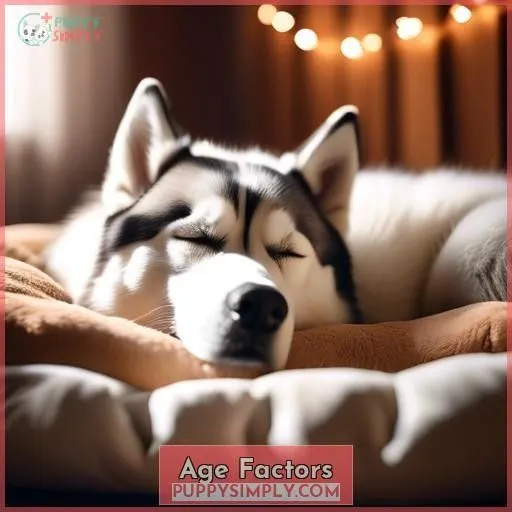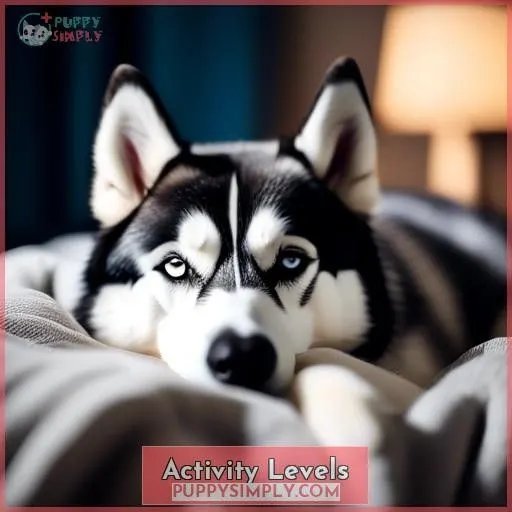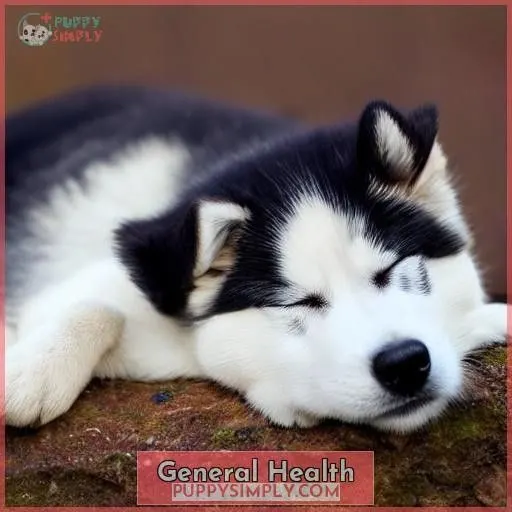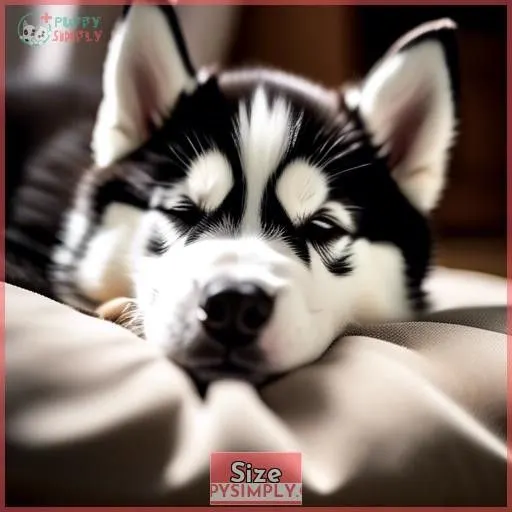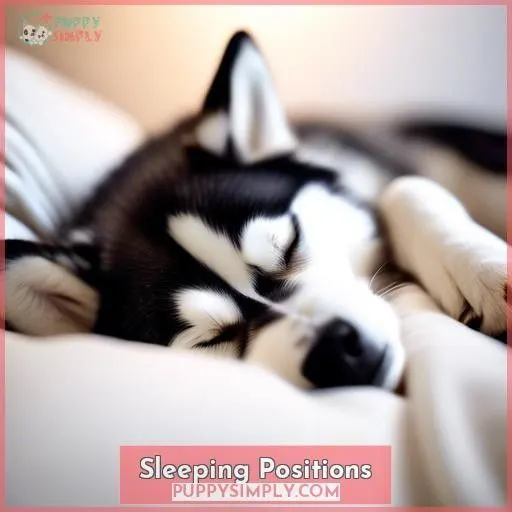This site is supported by our readers. We may earn a commission, at no cost to you, if you purchase through links.
As a Husky owner, you should anticipate your furry companion to slumber between 12-16 hours per day on average. Puppies demand the most sleep, up to 20 hours daily, while senior Huskies may necessitate even more repose.
Your Husky’s activity level, health, and stature all influence their sleep requirements. Augmented exercise and mental stimulation can assist in regulating their sleeping patterns. Certain medications, temperature, and environmental factors can also disrupt their slumber.
To ascertain your Husky is obtaining the appropriate amount of rest, heed their sleep habits and consult with your veterinarian if you have any concerns. Delving deeper into the intricacies of Husky sleep requirements can provide invaluable insights.
Table Of Contents
Key Takeaways
- Huskies typically sleep between 12-16 hours per day, with puppies requiring up to 20 hours daily and senior Huskies possibly needing even more rest.
- Activity level, health, and size all influence a Husky’s sleep requirements.
- Exercise, mental stimulation, a comfortable environment, feeding time, and bathroom breaks can help regulate a Husky’s sleep patterns.
- Age, breed, and health factors can impact a Husky’s sleep needs and patterns.
How Much Sleep Should a Husky Have?
Huskies typically need between 12 and 16 hours of sleep per day.
Husky Sleep Needs
As a Husky owner, you may be curious about how much rest your furry friend requires and how to make sure they get enough. Huskies are renowned for their boundless energy and playful nature, but they also need sufficient slumber to recover and preserve their overall well-being. Here’s a thorough guide on Husky sleep requirements, age factors, and suggestions for getting your Husky to sleep at night.
Age Factors: As Huskies age, they sleep more, and adult Huskies who are in their later stages of life will likely revert back to sleeping more frequently. Huskies with higher activity levels require more rest.
Activity Levels: Huskies are very energetic dogs, and they need more sleep to help them recover that energy. A Husky that has spent several hours walking, running, or doing other physical activity will probably need more sleep than a Husky who’s only gone for a half-hour walk.
Medication Taken: If your Husky is taking medication for any health issues, they might end up sleeping more than usual.
General Health: A healthy adult Husky will usually sleep between 12 to 16 hours a day. Some underlying health problems can either increase or decrease this average amount.
Size: Larger breeds of dogs generally need more rest to recuperate after bursts of energy than smaller breeds.
To assist your Husky in getting a good night’s sleep, consider the following tips:
- Exercise: Tire your Husky later in the day to help them sleep better at night.
- Mental Stimulation: Provide mental stimulation with toys or bones to keep your Husky engaged and tired.
- Comfortable Sleeping Space: Create a comfortable and quiet sleeping space for your Husky.
- Feeding Time: Feed your Husky later in the evening to help them settle down before bed.
- Bathroom Breaks: Take your Husky outside for a bathroom break before bed.
Age Factors
As your husky ages, their sleep needs will change. Puppies may sleep up to 20 hours a day, while adults need 12-16 hours of rest, with higher activity levels requiring more sleep.
Age-Related Sleep Changes
As your Husky ages, their slumber needs and rhythms will evolve. Here are some crucial aspects to contemplate:
- Puppies: Husky pups necessitate up to 20 hours of shut-eye per diem due to their rapid development and zeal.
- Adult Huskies: Mature Huskies ordinarily slumber between 12-16 hours per diem, contingent on their vivacity, well-being, and other elements.
- Senior Huskies: Aged Huskies might slumber more than their juniors, as they fatigue more swiftly and necessitate more repose.
To guarantee your Husky obtains the appropriate quantity of slumber, ponder the subsequent:
- Exercise: Furnish customary exercise to assist your Husky in exhausting themselves and preparing for slumber.
- Mental Stimulation: Proffer toys and diversions to maintain your Husky’s mind engaged and diminish the urgency for inordinate slumber.
- Comfortable Environment: Establish a tranquil, commodious ambit for your Husky to slumber, guaranteeing its suitability for their dimensions and solace.
- Health: Monitor your Husky’s well-being and manage any medical concerns that might impact their slumber patterns.
- Activity Level: Adapt your Husky’s slumber agenda predicated on their vivacity, guaranteeing they’re neither excessively fatigued nor under-exercised.
Activity Level Impact
As a Husky owner, you’re likely pondering how much exercise your furry companion needs to make sure they get the appropriate amount of rest. The amount of exercise your Husky requires depends on their age, activity levels, and overall well-being. Here’s a breakdown of how these factors influence your Husky’s sleep requirements:
- Age: Puppies usually sleep up to 20 hours per day, while adult Huskies require 12-16 hours of sleep daily. As Huskies age, they tend to sleep more, with older dogs needing more rest than middle-aged Huskies.
- Activity Levels: Huskies are energetic dogs that need to recover after bursts of energy. The more exercise your Husky gets, the more sleep they’ll need to rest and restore their energy.
- Health: Any health issues your Husky may have can impact their sleep duration. Illnesses or injuries can cause pain and discomfort, leading to changes in sleep patterns.
- Size: The size of your Husky can also affect their sleep requirements. Larger Huskies may tire more quickly than smaller ones, resulting in different sleep needs.
If you’re concerned about your Husky’s sleep patterns, it’s vital to observe their behavior and seek a veterinarian’s advice if necessary. Remember, individual differences in sleep needs can occur, and it’s fundamental to provide a comfortable and quiet sleeping space for your Husky to ensure they get the rest they need.
Health Influences Sleep
As a responsible pet owner, it’s crucial to comprehend the health factors that influence your Husky’s sleep patterns. Genetic influences, environmental factors, diet, and breed variations can all play a role in determining how much sleep your Husky requires and how well they rest.
Genetic influences can impact your Husky’s sleep needs, as their ancestors were bred for endurance and stamina. Even domesticated Huskies retain some of this energy, which needs to be balanced with sufficient rest periods.
Environmental factors, such as a comfortable and quiet sleeping space, can also affect your Husky’s sleep. Ensuring your Husky has a suitable environment for rest can help them get the quality sleep they need.
Diet can also impact your Husky’s sleep. A balanced diet that provides the necessary nutrients can help support your Husky’s overall health and well-being, which in turn can influence their sleep patterns.
Breed variations can also play a role in your Husky’s sleep needs. Different breeds may have different sleep requirements based on their size, energy levels, and other factors.
Health considerations, such as underlying health issues or medication, can disrupt your Husky’s sleep patterns, causing them to sleep more or less than usual. If you notice drastic changes in your Husky’s sleep habits, along with other symptoms like lethargy or loss of appetite, it’s advisable to consult your veterinarian.
Activity Levels
Just as a marathon runner crashes post-race, your Husky’s activity levels directly impact their snooze time. Think of sleep as their personal pit stop for energy restoration. High-energy days in vast, stimulating environments mean more z’s in the crate.
This exercise correlation isn’t just about physical fatigue; mental stimulation plays a huge role too. Notice how after a day of adventures, their sleep position variations unfold—each one a tale of comfort and recovery.
So, keep that energy high and watch as their sleeping positions narrate the story of their day.
Medication Taken
As a responsible pet owner, comprehending the implications of medication on your Husky’s sleep patterns is paramount. Certain medications may induce adverse effects that influence your Husky’s sleep duration and quality. For example, corticosteroids like prednisone can result in heightened thirst, urination, and panting, potentially disrupting your Husky’s sleep. Furthermore, non-steroidal anti-inflammatory drugs (NSAIDs) may cause hepatic and renal damage, which could impact your Husky’s overall well-being and sleep.
It is imperative to confer with your veterinarian regarding any apprehensions about medication side effects. They can offer direction on dosage, potential interactions, and alternative therapies that may be more appropriate for your Husky. In some instances, modifying the medication schedule or dosage may assist in mitigating side effects and enhancing your Husky’s sleep.
General Health
Your Husky’s overall health has a major role in determining their sleep needs and patterns. A healthy diet, regular exercise, and a safe environment are essential for maintaining good health and preventing health problems. Consulting with a veterinarian can help you create a customized diet plan that meets your Husky’s specific needs, ensuring they receive the necessary nutrients for overall well-being.
Environmental factors, breed differences, training methods, and diet impact can all influence your Husky’s general health and, consequently, their sleep duration and quality. Regular veterinary check-ups and observing your Husky’s behavior can help you identify any potential health concerns early on, allowing for timely intervention and treatment.
Size
Size Considerations:
When it comes to Husky sleep requirements, size plays a critical role. The size of your Husky can affect how much sleep they need and how long they rest. Here are some key points to keep in mind:
- Breed Differences: Different Husky breeds have varying sleep requirements. For example, the Siberian Husky typically needs 12-16 hours of sleep per day, while the Alaskan Malamute may require more due to their larger size and energy levels.
- Giant vs Miniature: The size of your Husky can affect their energy levels and sleep needs. Larger Huskies, such as the Alaskan Malamute, may require more sleep to recover from physical activities, while smaller breeds like the Miniature Husky may have lower energy and sleep needs.
- Micro vs Standard: Similar to the previous point, the size of your Husky can influence their sleep needs. Micro Huskies, which are smaller than standard Huskies, may have less energy and require less sleep. However, this can vary based on individual dogs.
- Temperature Effects: Huskies are adapted to cold climates and have thick coats to retain body heat. This can affect their sleep patterns, as they may need more rest during colder months to conserve energy.
Sleeping Problems
Sleep disorders can be a common issue in dogs, including Huskies. Some of the most common sleep disorders in dogs include insomnia, sleep apnea, narcolepsy, and rapid eye movement (REM) behavior disorder. Huskies, like other breeds, can be prone to these disorders due to their genetic predisposition, age, and health status.
- Insomnia: This disorder can cause trouble sleeping at the start of the night or waking up during the night and being unable to fall back asleep. Insomnia is often a sign of some other problem, such as an injury, anxiety, or illness, but can also be associated with old age in dogs.
- Sleep Apnea: This condition can lead to short breathing pauses that occur hundreds of times throughout the night, causing breathing troubles. Dogs that develop sleep apnea are often overweight or have a flat face, such as Boston Terriers, Pugs, and English Bulldogs.
- Narcolepsy: Dogs with narcolepsy can fall asleep without warning, even during play or excitement. This disorder is related to a problem with the production of hypocretin, a chemical that regulates sleep and wake cycles.
- REM Behavior Disorder: This rare sleep disorder allows for free limb movements during dreaming, which can cause your dog to howl, bark, growl, or bite.
To help your Husky with sleep disorders, make sure they’ve a comfortable, therapeutic bed that encourages deep sleep and alleviates achy joints and pain. You can also consult with a veterinarian to rule out any underlying medical conditions that may be causing discomfort.
Sleeping Positions
As your Husky sleeps, their body language can provide insight into their comfort level, pack behavior, and even potential health indicators. Here are some common sleeping positions and what they might mean:
- Belly Up: This position indicates comfort and security. The dog is exposing their vulnerable belly, trusting their environment and the people around them.
- Curled Up: Dogs in this position are often seeking protection from the elements and retaining body heat.
- Back to Back: This position signifies love and comfort, as the dog is cuddling up and getting as close as possible to you or another dog.
- Head and Neck Raised: Dogs who sleep in this position may have issues with breathing, so keep an eye out for symptoms like faster breathing or noisy breathing.
- Lion Pose: Dogs in this position are alert and loyal, often keeping watch over their family.
- Superman Pose: This playful position is typically seen in energetic breeds like French Bulldogs and Pugs.
- Belly Up (Dying Cockroach): This position is common in playful and loving dogs, or those who are still puppies.
If your Husky is experiencing any unusual sleep patterns or positions, it may be worth consulting a veterinarian to rule out any underlying health issues.
Crate Training
Crate training your Husky can be a vital component of their sleep routine. Here’s what you need to know:
- Crate Size: Make sure the crate is big enough for your Husky to be relaxed.
- Crate Location: Position the crate beside your bed or put a mattress in the crate.
- Crate Routine: Gradually increase the time your Husky spends in the crate, starting with brief periods and gradually extending them.
Frequently Asked Questions (FAQs)
How does a Huskys sleep pattern change with age?
Just like a blossoming flower, a Husky’s sleep needs evolve. As pups, they doze up to 20 hours, but adults only need 12- As they age gracefully, their slumber increases, mirroring their energy levels’ gentle decline.
What is the average sleep duration for a husky puppy?
Husky puppies need up to 20 hours of sleep per day. That furry bundle of energy you call your pup is recharging for their next round of zoomies!
How does a Huskys sleep need vary based on their activity level?
Huskies that are more active need 14-16 hours of sleep to recover their energy reserves. An exhausted husky is a happy husky, as the saying goes. Ensuring adequate exercise and mental stimulation is key for their overall well-being.
Can medication affect a Huskys sleep duration?
Certain meds like sedatives can make your furry pal drowsier, while stimulants may keep them more wired. So if Fido’s sleep patterns seem off, don’t rule out those prescription pals as potential culprits. A quick chat with your vet should clear things up.
What is the ideal sleeping position for a Husky?
The ideal sleeping position for a Husky? Well, they’re quite the cuddly pups! A curled-up ball conserves warmth and mimics their wild ancestors’ instincts. But a sprawled-out, belly-up snooze signals pure bliss and comfort in their beloved den.
Conclusion
Ultimately, monitoring your Husky’s sleep patterns with meticulous attention is paramount to ensuring they receive the necessary amount of slumber.
By understanding how much sleep a Husky should have based on factors like age, size, and activity levels, you can foster a healthier, more rested companion.
Consult your veterinarian if any sleeping irregularities arise, as sufficient rest is vital for your furry friend’s overall well-being.



